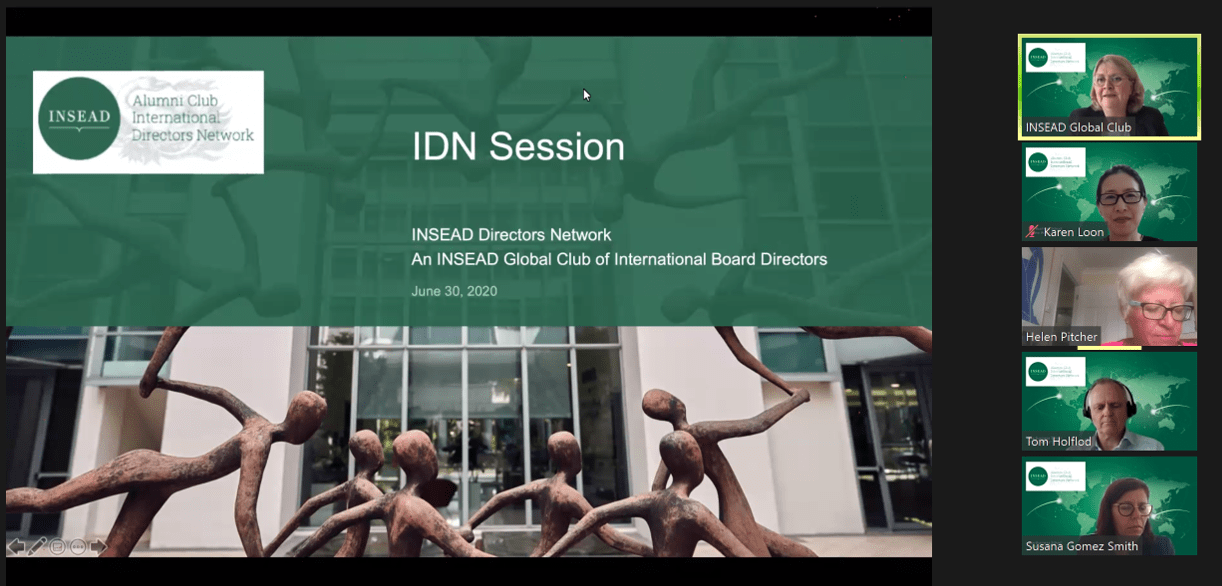Boards are spending more time on people matters, as stakeholder expectations change, according to IDN members
By Karen Loon IDP-C, IDN Board Member and Non-Executive Director
IDN members had the opportunity to share their recent experiences in the board room, including on sustainability in an IDN digital dialogue held on 30 June 2020. The session, which was attended by 65 international board members from 26 countries, was facilitated by Liselotte Hägertz Engstam, IDP-C and IDN Board Member with opening remarks provided by IDN President, Helen Pitcher OBE, IDP-C.
COVID-19 has generally accelerated the change taking place in companies, however, it has refocused good companies of the importance of their people and the environment they operate in. Members shared that, despite some focus on short term objectives, there was a sense that sustainability will become central to how things are done.
“The question which all boards need to ask themselves is, when times get tough, do you abandon good principles for short term gain, or double down for the long-term benefit of all?”– Jeff Scott, IDP-C, IDN Board Member.
Three key themes emerged from the breakout room discussions facilitated by IDN Board Members and ambassadors.
Increased people centricity
IDN members have been very busy in the past six months, given the rapid changes in some of their companies, yet recognise that there is a need to balance their oversight roles, and provide unconditional support to management, without getting in the way. Many boards were focused on supporting the physical and mental well-being of their people, particularly as working remotely becomes more customary.
For board members, having agility at the right time, empathy to thank management and staff for their responses to the crisis, and re-connecting with management through the purpose of the company was viewed as essential.
Continue to focus on the long term
Whilst the risks which companies need to manage have changed as a result of the crisis, many board members are increasingly focused on long term perspectives as executives are overwhelmed with shorter term priorities and challenges. This includes reflecting on the company’s purpose as stakeholder expectations change (especially people, customers and regulators, as differences arise between jurisdictions); ensuring there is more proactive communication between the board, management and stakeholders; and focusing on how companies can maintain a healthy corporate culture.
Keep sustainability on the board agenda
The views of IDN members on whether boards are focused on sustainability were mixed. A number of members were concerned that sustainability is being perceived by some boards as a luxury/nice to have, and it is dropping off the board agenda as boards focus on the survival of their companies. Others felt that if it was not already engrained in the DNA of the company, it has crumbled during the crisis.
There was a general sense that it is important that sustainability is put back on the board agenda, given the increasing reputational risk and brand perception if nothing happens, increasing pressure from investors who are pushing for more “green performance” and new regulations which require ESG disclosure and reporting. Others cited that customers increasingly are expecting that companies are sustainable. Some believe that sustainability starts with us as directors and what we do at a personal and work level; we have a role to demonstrate commitment and should take the opportunity to “bake in” sustainability into the fabric of the companies we work with, so it is embedded in the culture and behaviours of the business.
Other discussion areas included the challenges for the remuneration committee given financial and regulatory pressures, and ensuring that companies learn from other countries and companies to enable a rapid response, for example China.
In her session recap, Helen Pitcher OBE said:
“The time flew by, the sessions were energetic and insightful demonstrating both the calibre and deep knowledge of the Directors present, as well as the excellent way they have risen to support their many and varied Boards through the pandemic. All Directors had maintained a focus on the long term, whilst responding to the immediacy of the challenges”.
She concluded that it is important for non-executive directors to maintain a balance when supporting their companies through a crisis. This includes supporting long term performance (agility, results, and liquidity) of their companies, people (through empathy), and sustainability (transparency, purpose and ESG).

